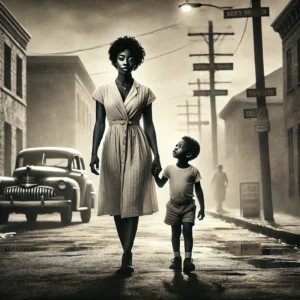Tough love is harsh

If you grew up in a Black family, you’ve likely felt the impact of “tough love.” Maybe it was the way your mother’s sharp words corrected you before you could embarrass yourself—or her. Or the way your father’s firm discipline taught you that some mistakes come with consequences. Tough love is woven into the fabric of our culture, a legacy handed down through generations as a way of preparing us for a world that’s often unkind.
But as parenting styles shift and the conversation leans toward gentler methods, it’s time to pause and ask: Are we better off now? Or are we losing something valuable in the process?
This isn’t an easy question, and this isn’t a post to provide neat answers. This is a space to reflect, to ask yourself what’s working, what’s not, and whether we might be throwing out the baby with the bathwater as the Black community embraces new approaches to raising children.
Drawing from almost two decades of experience in children’s services, where countless interactions with families, young people, and caregivers reveal how decisions shape lives, the intent here is to ask questions that provoke reflection, not to dictate how things should be.
__________________________________ ______
 To understand tough love, you have to consider where it came from. For generations, some Black parents have used discipline not as cruelty but as a means of survival. When children were warned to stay in line or to act “right” in public, it wasn’t just about behaviour—it was about safety.
To understand tough love, you have to consider where it came from. For generations, some Black parents have used discipline not as cruelty but as a means of survival. When children were warned to stay in line or to act “right” in public, it wasn’t just about behaviour—it was about safety.
Think about the stories passed down: warnings to “keep your head down” in certain spaces or to “always act twice as good” just to be seen as competent. These weren’t random instructions; they were tools for survival in societies where being Black meant walking a fine line between existing and being punished for it.
This approach to parenting was a way of building resilience. It was about teaching children to be strong, disciplined, and prepared for a world that often required more from us than it gave. But here’s the rub: While tough love created strength, it sometimes left scars too. It could be harsh. It could feel unyielding. And for some, it created a distance between parent and child that wasn’t easy to bridge.
________________________________________

Fast forward to now, and the parenting landscape looks different. There’s a growing focus on emotional intelligence, mental health, and nurturing children in ways that prioritise their well-being over strict discipline. Parents are being encouraged to explain instead of scold, to listen instead of dictate, to let children explore and grow without fear of punishment.
These shifts have brought positive change. Children feel heard. They’re more in touch with their emotions. They’re learning that their voices matter.
But at the same time, you can’t help but notice some troubling trends in society. Violence among youth. The rise of online bullying. A culture of instant gratification that sometimes erodes respect for authority, teachers, or even parents.
Let’s be clear: These issues aren’t unique to Black families. They’re widespread, crossing racial and cultural lines. But as Black people, we know that the challenges we face can hit differently. Our kids grow up in a world where racism, inequality, and systemic barriers are ever-present. And while new parenting methods focus on empowerment, it’s worth asking: Are we still giving our children the tools they need to navigate this tough reality?
________________________________________
When you think back to your own upbringing, you might remember moments that stung at the time but made sense later. Maybe it was the strict curfew that kept you out of trouble. The lecture about respect that taught you to navigate authority figures with care. Or the insistence on excellence because mediocrity simply wasn’t an option for you.
These lessons shaped you. They gave you the resilience to push through adversity, the discipline to succeed where others doubted you, and the understanding that life wouldn’t always give you what you deserved.
Now think about the children growing up today. Without those same boundaries, are they as prepared to handle rejection, criticism, or the realities of a world that doesn’t always cater to their feelings? Are we focusing so much on making them feel seen and heard that we’re not teaching them how to face challenges and grow from them?
Of course, tough love wasn’t perfect. Some of its methods left wounds that take years—or lifetimes—to heal. But what if, in moving away from it entirely, we’re losing the resilience it instilled? What if we’re raising children who are unprepared for a world that, frankly, isn’t always kind?
________________________________________
The truth is, there are no easy answers here. Parenting isn’t one-size-fits-all, and every generation adapts to the world it finds itself in. Our parents raised us with tough love because they had to. Many of today’s parents are trying gentler approaches because they believe it’s what children need now.
But as you reflect, it’s worth asking yourself some hard questions. Are we balancing care and discipline? Are we raising children who understand boundaries, responsibility, and accountability while still feeling supported and loved? Or are we leaning too far in one direction, leaving them unprepared for a world that won’t always bend to their needs?
There’s no blueprint for this, and every family will answer these questions differently. But as Black families embrace new ways of parenting, let’s not lose sight of the wisdom in our roots. Tough love wasn’t perfect, but it carried lessons that helped many of us navigate a complex and often unjust world.
So, as you ponder this, ask yourself: Are Black people raising children who can thrive in the world as it is, while working toward the world we want it to be? Because ultimately, that’s what we all want—for Black kids to succeed, to grow, and to carry the strength of our culture into a brighter future.
Tough love is harsh
4-minute read Have you ever found yourself lying awake at night, heart heavy with worry about your teenager’s safety during interactions with the police? It’s a question that lingers for many parents and caregivers, especially when history and statistics both
4-minute read I’ve spent a lot of time thinking about beauty—what it means, who gets to define it, and whether it’s really as inclusive as we like to think. And the more I look at it, the more I realize
4-minute read Let’s be honest—the Hidden Agenda Behind Beauty Ads is everywhere. They follow us on our phones, pop up in our social feeds, and even sneak their way into our subconscious when we least expect it. One minute you’re
2 responses
Tough love is harsh